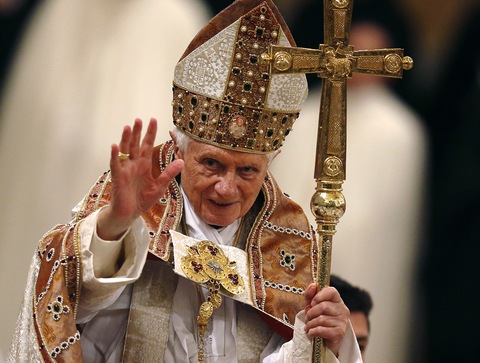
A friend was in Rome for the novices and seminarians 'rally' with Pope Francis. He was very impressed especially with the numbers of young men and women in habits and cassocks on the Roman streets. He saw the rapturous welcome given to the Pope at the audience on the Saturday and at the more muted on at the Mass on the Sunday. He spent quite some time talking to English speaking student's for the priesthood, both members of religious orders and diocesan seminarians from the US, E&W, Australia and elsewhere, as well as Italian students.
He was impressed by the enthusiasm for, 'going out to the peripheries', though most admitted not to quite understanding what Pope Francis meant by it. What he said seemed significant was the enthusiasm they all seemed to have for Pope Benedict, under whom they had discovered their vocation. He said what surprised him was a deep sense of bereavement practically all seemed to express. Another priest told me a seminarian had said to him of Benedict's resignation, 'I feel bereaved, I feel my father has left me'.

 Our faith teaches us that the Church is 'Inerrant', that the hell will not prevail against the Church, that the Holy Spirit leads the Church into all Truth, that Christ will be with us to the end of time, etc., etc. but then against that so much seems to be up for grabs. Everyone seems to accept the need for reform or renewal of the Pit which is the Curia, there is talk about decentralisation, talk even of Synodal government of the Church. There are suggestions that though the Catholic Faith, for example, on the nature of marriage is unchanging but that the discipline concerning how those who are in irregular unions could be dealt with on a more localised level. The same with how pro-gay, pro-abort politicians are to be dealt with, and other issues besides, which in fact might be just a recognition of what in fact actually is the real situation. Cardinal Burke might say one thing but local bishops, even Italian bishops, even bishops in the diocese of Rome say something quite different.
Our faith teaches us that the Church is 'Inerrant', that the hell will not prevail against the Church, that the Holy Spirit leads the Church into all Truth, that Christ will be with us to the end of time, etc., etc. but then against that so much seems to be up for grabs. Everyone seems to accept the need for reform or renewal of the Pit which is the Curia, there is talk about decentralisation, talk even of Synodal government of the Church. There are suggestions that though the Catholic Faith, for example, on the nature of marriage is unchanging but that the discipline concerning how those who are in irregular unions could be dealt with on a more localised level. The same with how pro-gay, pro-abort politicians are to be dealt with, and other issues besides, which in fact might be just a recognition of what in fact actually is the real situation. Cardinal Burke might say one thing but local bishops, even Italian bishops, even bishops in the diocese of Rome say something quite different. At the end of JPII's regin there were two major theological trends, simply put, Ratzinger's based on centralisation and Walter Kasper's, (a development of Paul VI's rather stop start theology) based on localisation. Kasper, interestingly, was the first theologians quoted by Francis as Pope. The problem is that most of the Cardinal's including the 'Gang of Eight' are conservatives, whose conservatism goes back to their seminary days in the reign of Pope Paul VI.
Is this healthy for the Church? I don't know, it strikes me there is something disorienting and destructive of unity, in pendulums swinging in opposite directions with each Pope. Has Pope Francis the intellectual capacity, the courage and the charisma to do what is necessary but most of all the ability to hold the Church together while he does it? Let us pray he has.






0 comments:
Post a Comment